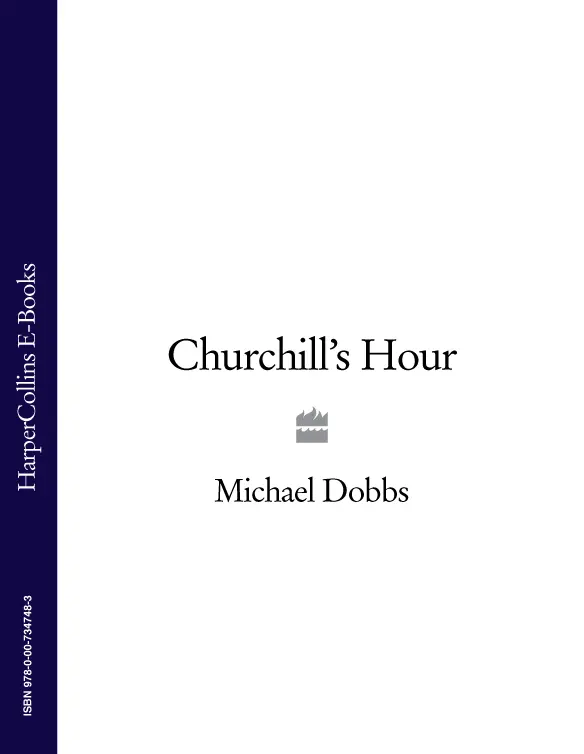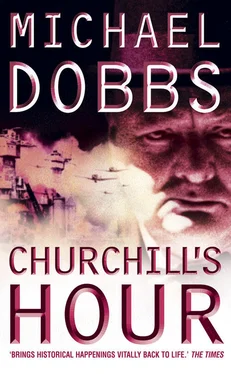
CHURCHILL’S HOUR
MICHAEL DOBBS
‘One of the most misleading factors in history is the practice of historians to build a story exclusively out of the records which have come down to them.’
WINSTON CHURCHILL

TO WILL.
TO MIKEY.
TO ALEX.
TO HARRY.
MY FOUR MUSKETEERS.
‘We shall go on to the end. We shall fight in France, we shall fight on the seas and oceans, we shall fight with growing confidence and growing strength in the air. We shall defend our island, whatever the cost may be. We shall fight on the beaches, we shall fight on the landing grounds, we shall fight in the fields and in the streets, we shall fight in the hills. We shall never surrender.
‘And even if, which I do not for a moment believe, this island or a large part of it were subjugated and starving, then our Empire beyond the seas, armed and guarded by the British Fleet, would carry on the struggle, until, in God’s good time, the new world, with all its power and might, steps forth to the rescue and the liberation of the old.’
WINSTON CHURCHILL, June 1940
‘I have said this before, but I shall say it again and again and again. Your boys are not going to be sent into any foreign wars.’
FRANKLIN D. ROOSEVELT, October 1940
Cover Page
Title Page CHURCHILL’S HOUR MICHAEL DOBBS ‘One of the most misleading factors in history is the practice of historians to build a story exclusively out of the records which have come down to them.’ WINSTON CHURCHILL
Dedication TO WILL. TO MIKEY. TO ALEX. TO HARRY. MY FOUR MUSKETEERS.
Epigraph ‘We shall go on to the end. We shall fight in France, we shall fight on the seas and oceans, we shall fight with growing confidence and growing strength in the air. We shall defend our island, whatever the cost may be. We shall fight on the beaches, we shall fight on the landing grounds, we shall fight in the fields and in the streets, we shall fight in the hills. We shall never surrender. ‘And even if, which I do not for a moment believe, this island or a large part of it were subjugated and starving, then our Empire beyond the seas, armed and guarded by the British Fleet, would carry on the struggle, until, in God’s good time, the new world, with all its power and might, steps forth to the rescue and the liberation of the old.’ WINSTON CHURCHILL, June 1940 ‘I have said this before, but I shall say it again and again and again. Your boys are not going to be sent into any foreign wars.’ FRANKLIN D. ROOSEVELT, October 1940
ONE
TWO
THREE
FOUR
FIVE
SIX
SEVEN
EIGHT
NINE
TEN
ELEVEN
TWELVE
THIRTEEN
FOURTEEN
FIFTEEN
EPILOGUE
Acknowledgements
About the Author
Also by the Author
Copyright
About the Publisher
Christmas Day, 1940.
Winston Churchill sat propped up against the pillows of his bed. The room was cold, a sullen December sky rattling at the mullioned window, but the old man didn’t complain. The foul weather had kept the bombers at bay last night. Peace on earth, at least until tomorrow.
A servant entered the room carrying a pair of freshly ironed trousers on one arm and a silver tray on the other. Frank Sawyers was short, hairless, with piercing blue eyes and two missing teeth. He was no more than forty years in age yet his attitude was timeless.
‘Did you knock?’ Churchill’s brow was split by a crease of irritation.
‘As always, zur,’ Sawyers said, a trifle wearily and with a pronounced lisp and Cumbrian burr.
‘And what’s that disgusting green stuff?’ The Prime Minister took off his reading glasses and used them to indicate the jar on the silver tray. ‘No medicine, do you hear me? I’ll have none of your quackery. I’m not ill.’
‘Chutney. Home-made. By way of me Christmas present to yer, like. With season’s greetings.’
Churchill stared at the jar, his blue eyes alert as though suspecting some plot. Sawyers had a knack of producing exotic and unexpected gifts, even through the constraints of wartime, and Churchill knew that no matter how alarming the sour green pickle might appear, it would taste delicious. He didn’t have the knack himself; he’d given only books for presents, and mostly his own books at that.
As he approached the bed, the servant glared at Nelson, the patch-eyed cat who lay sprawled across the eiderdown at Churchill’s feet. Nelson possessed a foul temper that had grown ever more unreliable from spending too many nights in Downing Street during the air raids, and Sawyers’ loathing for the cat had grown with the number of scratch marks left on the back of his hands. He gave the beast a wide berth as he placed the tray on the bedside table and dealt with the refreshed trousers. Then he took down a vivid red silk bathrobe that was hanging on the back of the door.
‘Not yet,’ Churchill said, ‘I’ve not finished my papers.’
‘You’ll be late,’ the other man insisted. ‘Family’s already gathered round fire, and if you’re not down there soon, Mr Oliver will be on serenading us all with his piano music.’
‘Bloody racket.’
‘Exactly,’ Sawyers agreed, holding up the bathrobe in the manner of a matador tempting a bull.
‘Not now, not now,’ Churchill said, shaking the paper in his hand. ‘D’you know there’s a Nazi battleship on the loose in the southern Atlantic?’
‘I dare say it’ll still be there after luncheon.’ The servant stood resolute. ‘You can sink it then.’
Churchill was contemplating the next phase of this battle for domestic supremacy when, in some distant part of the old house, notes began to cascade from a piano and a baby started to cry. Instantly Nelson sprang from his warming place at the old man’s feet, arching his back in displeasure before strutting from their view. Churchill had been deserted by his last remaining ally. Sawyers barely stirred. Only the rustle of the silk robe and the elevation of the left eyebrow suggested he was claiming victory.
Churchill cursed. His concentration was broken and nothing more would be achieved that morning. He had lost the battle of the bathrobe. He heaved himself from his bed, scattering papers in his wake, and, ignoring his servant, stomped off in the direction of the bathroom.
It was known as Chequers Court, an age-mellowed manor house constructed of red brick and surrounded by parklands and beech woods in the Chiltern hills, some forty miles to the north-west of London. It was graced by ambitious chimneys, loose windows and a system of heating that, in deference to the ancient timbers, remained totally inadequate. Chequers had once belonged to Mr and Mrs Arthur Lee, who had no children and therefore no lasting use for the property, so in 1921 they had handed it over to the nation complete with all its furniture and fine paintings as a country retreat for whoever was Prime Minister of the day. A year earlier the occupant had been Neville Chamberlain, a proud but inadequate man who remained mercifully unaware that the dogs of misfortune were already on his trail and would soon tear him apart. Calamity had got him first, then cancer, and only six weeks ago they had buried him. Dust to dust. So the keys had been passed to Winston Churchill, who had summoned three generations of his family to spend Christmas with him in his new retreat. It was to be a special occasion, one that everyone present would remember, although, in hindsight, not for all the most comforting reasons.
Читать дальше














